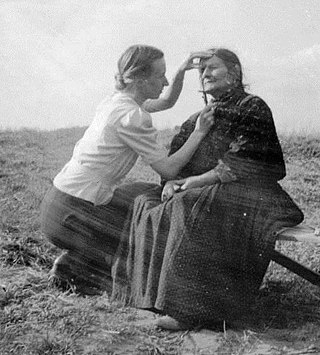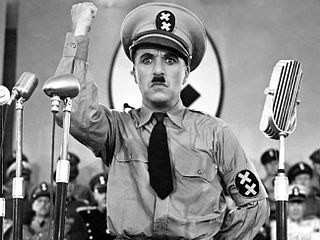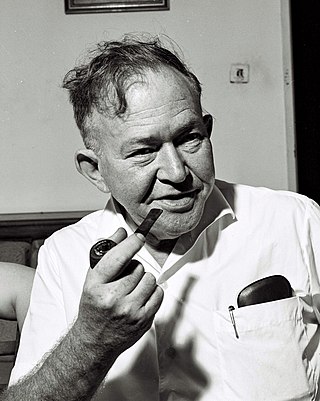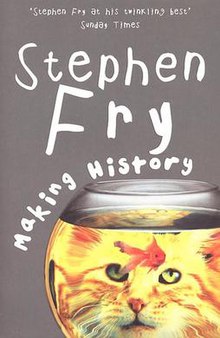
Mein Kampf is a 1925 autobiographical manifesto by Nazi Party leader Adolf Hitler. The work describes the process by which Hitler became antisemitic and outlines his political ideology and future plans for Germany. Volume 1 of Mein Kampf was published in 1925 and Volume 2 in 1926. The book was edited first by Emil Maurice, then by Hitler's deputy Rudolf Hess.

The racial policy of Nazi Germany was a set of policies and laws implemented in Nazi Germany under the dictatorship of Adolf Hitler, based on pseudoscientific and racist doctrines asserting the superiority of the putative "Aryan race", which claimed scientific legitimacy. This was combined with a eugenics program that aimed for "racial hygiene" by compulsory sterilization and extermination of those who they saw as Untermenschen ("sub-humans"), which culminated in the Holocaust.

Braunau am Inn is a town in Upper Austria on the border with Germany.

Friedrich Gustav Emil Martin Niemöller was a German theologian and Lutheran pastor. He is best known for his opposition to the Nazi regime during the late 1930s and for his widely quoted 1946 poem "First they came ...". The poem exists in many versions; the one featured on the United States Holocaust Memorial reads: "First they came for the socialists, and I did not speak out – because I was not a socialist. Then they came for the trade unionists, and I did not speak out – because I was not a trade unionist. Then they came for the Jews, and I did not speak out – because I was not a Jew. Then they came for me – and there was no one left to speak for me."

Alois Hitler was an Austrian civil servant in the customs service, and the father of Adolf Hitler, dictator of Germany, from 1933 to 1945.

Heinrich Müller was a high-ranking German Schutzstaffel (SS) and police official during the Nazi era. For most of World War II in Europe, he was the chief of the Gestapo, the secret state police of Nazi Germany. Müller was central in the planning and execution of the Holocaust and attended the January 1942 Wannsee Conference, which formalised plans for deportation and genocide of all Jews in German-occupied Europe—The "Final Solution to the Jewish Question". He was known as "Gestapo Müller" to distinguish him from another SS general named Heinrich Müller.

Adolf Hitler, dictator of Germany from 1933 to 1945, has been represented in popular culture ever since he became a well-known politician in Germany. His distinctive image was often parodied by his opponents. Parodies became much more prominent outside Germany during his period in power. Since the end of World War II representations of Hitler, both serious and satirical, have continued to be prominent in popular culture, sometimes generating significant controversy. In many periodicals, books, and movies, Hitler and Nazism fulfill the role of archetypal evil. This treatment is not confined to fiction but is widespread amongst nonfiction writers who have discussed him in this vein. Hitler has retained a fascination from other perspectives; among many comparable examples is an exhibition at the German Historical Museum which was widely attended.

Michael Ritter von Faulhaber was a German Catholic prelate who served as Archbishop of Munich for 35 years, from 1917 to his death in 1952. Created Cardinal in 1921, von Faulhaber criticized the Weimar Republic as rooted in treason in a speech at the 62nd German Catholics' Day of 1922. Cardinal von Faulhaber was a leading member and co-founder of the Amici Israel, a priestly association founded in Rome in 1926 with the goal of working toward the Jewish conversion to Christianity in a non-polemical manner.
The functionalism–intentionalism debate is a historiographical debate about the reasons for the Holocaust as well as most aspects of the Third Reich, such as foreign policy. It essentially centres on two questions:

The Meaning of Hitler is a 1978 book by the journalist and writer Raimund Pretzel, who published all his books under the pseudonym Sebastian Haffner. Journalist and military historian Sir Max Hastings called it 'among the best' studies of Hitler; Edward Crankshaw called it a 'quite dazzlingly brilliant analysis'.

Adolf Hitler was an Austrian-born German politician who was the dictator of Germany from 1933 until his suicide in 1945. He rose to power as the leader of the Nazi Party, becoming the chancellor in 1933 and then taking the title of Führer und Reichskanzler in 1934. During his dictatorship, he initiated World War II in Europe by invading Poland on 1 September 1939. He was closely involved in military operations throughout the war and was central to the perpetration of the Holocaust, the genocide of about six million Jews and millions of other victims.

The Zweites Buch, published in English as Hitler's Secret Book and later as Hitler's Second Book, is an unedited transcript of Adolf Hitler's thoughts on foreign policy written in 1928; it was written after Mein Kampf and was not published in his lifetime.
The Jewish question, also referred to as the Jewish problem, was a wide-ranging debate in 19th- and 20th-century Europe that pertained to the appropriate status and treatment of Jews. The debate, which was similar to other "national questions", dealt with the civil, legal, national, and political status of Jews as a minority within society, particularly in Europe during the 18th, 19th, and 20th centuries.

Joel Brand was a member of the Budapest Aid and Rescue Committee, an underground Zionist group in Budapest, Hungary, that smuggled Jews out of German-occupied Europe to the relative safety of Hungary, during the Holocaust. When Germany invaded Hungary in March 1944, Brand became known for his efforts to save the Jewish community from deportation to the Auschwitz concentration camp in occupied Poland and the gas chambers there.
The religious beliefs of Adolf Hitler, dictator of Nazi Germany from 1933 to 1945, have been a matter of debate. His opinions regarding religious matters changed considerably over time. During the beginning of his political life, Hitler publicly expressed favorable opinions towards Christianity, but later totally rejected it. Most historians describe his later posture as adversarial to organized Christianity and established Christian denominations. He also criticized atheism.

The Ultimate Solution is a 1973 alternate history novel by journalist and former Playboy interviewer Eric Norden, set in a world where the Axis forces won World War II and partitioned the world between them. The novel is noted for its particularly grim tone. Norden later wrote the 1977 Adolf Hitler-related science fiction novella The Primal Solution.
The Hitler family comprises the relatives and ancestors of Adolf Hitler, an Austrian-born German politician and the leader of the Nazi Party, who was the dictator of Germany, holding the title Chancellor of Germany from 1933 to 1945, and head of state as Führer und Reichskanzler from 1934 to 1945. Adolf Hitler had a central role in the rise of Nazism in Germany, provoking the start of World War II, and holding ultimate responsibility for the deaths of many millions of people during the Holocaust.
Nazism, the common name in English for National Socialism, is the far-right totalitarian socio-political ideology and practices associated with Adolf Hitler and the Nazi Party (NSDAP) in Nazi Germany. During Hitler's rise to power in 1930s Europe, it was frequently referred to as Hitlerism. The later related term "neo-Nazism" is applied to other far-right groups with similar ideas which formed after the Second World War. Nazism is a form of fascism, with disdain for liberal democracy and the parliamentary system. It incorporates a dictatorship, fervent antisemitism, anti-communism, anti-Slavism, scientific racism, white supremacy, Nordicism, social Darwinism and the use of eugenics into its creed. Its extreme nationalism originated in pan-Germanism and the ethno-nationalist Völkisch movement which had been a prominent aspect of German ultranationalism since the late 19th century. Nazism was strongly influenced by the Freikorps paramilitary groups that emerged after Germany's defeat in World War I, from which came the party's underlying "cult of violence". It subscribed to pseudo-scientific theories of a racial hierarchy, identifying ethnic Germans as part of what the Nazis regarded as an Aryan or Nordic master race. Nazism sought to overcome social divisions and create a homogeneous German society based on racial purity which represented a people's community. The Nazis aimed to unite all Germans living in historically German territory, as well as gain additional lands for German expansion under the doctrine of Lebensraum and exclude those whom they deemed either Community Aliens or "inferior" races.

During a speech at the Reichstag on 30 January 1939, Adolf Hitler threatened "the annihilation of the Jewish race in Europe" in the event of war:
If international finance Jewry inside and outside Europe should succeed in plunging the nations once more into a world war, the result will be not the Bolshevization of the earth and thereby the victory of Jewry, but the annihilation of the Jewish race in Europe.














